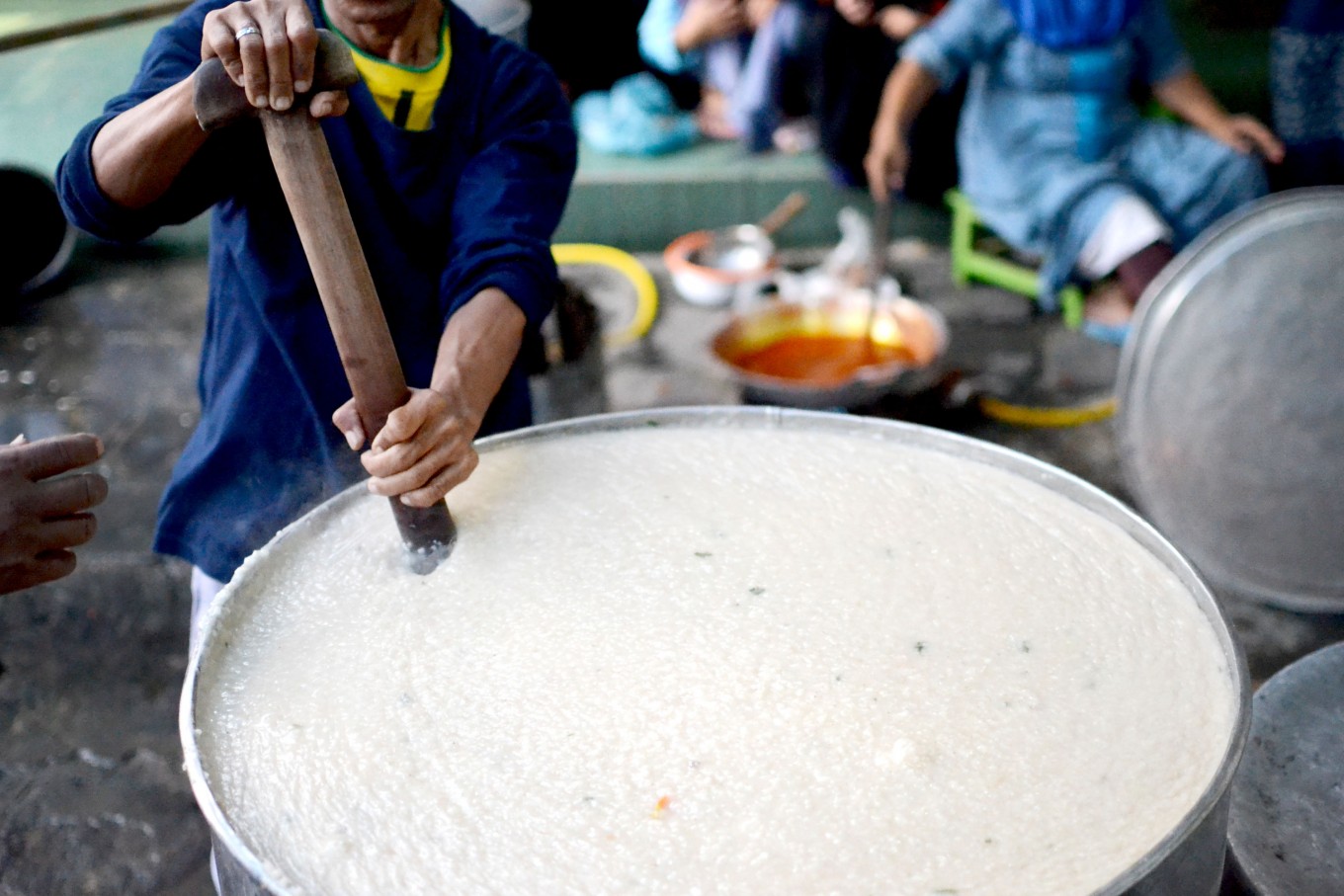Popular Reads
Top Results
Can't find what you're looking for?
View all search resultsPopular Reads
Top Results
Can't find what you're looking for?
View all search resultsSurakarta kampong keeps porridge tradition alive
Cooking the Samin Banjar porridge is an annual activity at the mosque. That afternoon, more than 1000 portions of porridge were prepared, using 45 kilograms of rice and samin oil, which explains where the name comes from.
Change text size
Gift Premium Articles
to Anyone
Crowds gathered in the courtyard of the Darussalam mosque on Monday afternoon, the first day of Ramadhan.
Situated in the Jayengan kampong of Surakarta, Darussalam is a historic mosque that has been standing since the early 1900s. With the entrance located in a small alley, the place has a little courtyard that also functions as a playground for the kindergarten of the Darussalam foundation.
 Dozens of people gather at Darussalam mosque to receive Samin Banjar porridge for breaking the fast.(JP/Stefanus Ajie)
Dozens of people gather at Darussalam mosque to receive Samin Banjar porridge for breaking the fast.(JP/Stefanus Ajie)
In the courtyard, a couple of men were standing around a large pot, stirring rice porridge with a wooden tool resembling a paddle more than a spoon. They took turns stirring, while others poured extra ingredients into the pan or kept themselves busy milking coconuts, cutting beef and prepare chili paste. The rice needs to be stirred continuously for 5-6 hours to achieve good porridge with all the flavors and spices mixed perfectly.
Cooking the Samin Banjar porridge is an annual activity at the mosque. That afternoon, more than 1000 portions of porridge were prepared, using 45 kilograms of rice and samin oil, which explains where the name comes from.
(Read also: Break the fast in style at these hotels in Jakarta)
 Residents at the Darussalam mosque in Jayengan, Surakarta, cook Samin Banjar porridge for iftar on Monday.(JP/Stefanus Ajie)
Residents at the Darussalam mosque in Jayengan, Surakarta, cook Samin Banjar porridge for iftar on Monday.(JP/Stefanus Ajie)
The recipe is said to have been inherited from the locals' ancestors, who migrated from Banjar in Kalimantan and settled in Jayengan in the early 20th centurys.
By late afternoon, people began to arrive at the Darussalam mosque, carrying food containers. Within minutes, dozens of people, mostly women and children, had gathered in the mosque's courtyard, waiting for the Samin Banjar porridge to be distributed. After prayer time, the dish was ready to be served.
 Samin Banjar porridge is made of rice, beef, coconut milk and cumin oil. The recipe was inherited through generations by the people of Banjar in Surakarta.(JP/Stefanus Ajie)
Samin Banjar porridge is made of rice, beef, coconut milk and cumin oil. The recipe was inherited through generations by the people of Banjar in Surakarta.(JP/Stefanus Ajie)
Darussalam mosque takmir chairman Mohammad Rosyidi started the event with a prayer. Then, four people standing in the middle of the crowd began to distribute the porridge to the people around them. People kept coming, and leaving again after receiving the dish as their iftar menu.
More than 1,000 portions of porridge were distributed for free that Monday afternoon. A large pot of the dish was also prepared for those wanting to break the fast at the mosque.
The Samin Banjar porridge is cooked and shared at the mosque every day during the holy month. Rosyidi said the tradition started with the arrival of Banjar people in Surakarta around 1911. At the time, a variety of dishes would be served for breaking the fast, including cumin porridge.
(Read also: 6 Middle-Eastern restaurants to visit in Jakarta)
 Young girls learn from the elders how to cook chili paste as a condiment for Samin Banjar porridge.(JP/Stefanus Ajie)
Young girls learn from the elders how to cook chili paste as a condiment for Samin Banjar porridge.(JP/Stefanus Ajie)
Cooking porridge to break the fast became an annual tradition of the Banjar people in the 1960s. Since 1985, the porridge is not only enjoyed by the community of Banjar people at the Darussalam mosque, but also distributed to the public. In addition to locals, people from outside Surakarta can be found visiting the place simply to taste the legendary dish.
From year to year, the number of visitors in Jayengan during Ramadhan is increasing. Fortunately, the number of people donating ingredients to make the porridge is also rising. Thus, the tradition of handing out free porridge for iftar will continue to grace the holy month at the Darussalam mosque. (kes)







